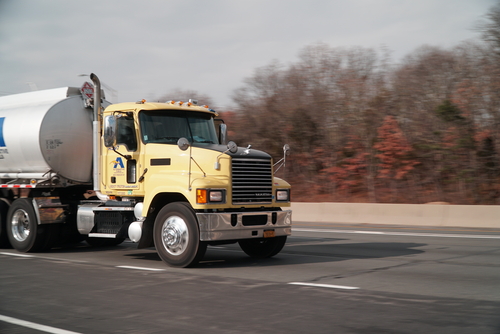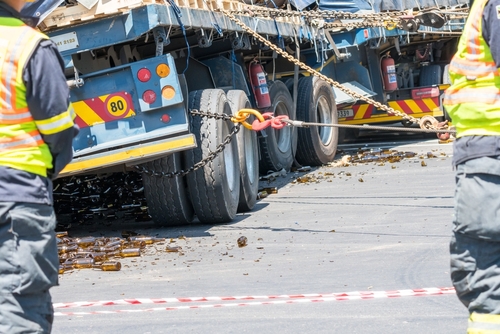Trucking accidents that result from driver or company negligence can lead to severe injuries, some of which are permanent. These injuries usually happen because of the significant force often associated with these accidents. Some of the most frequent truck accident injuries include traumatic head and brain damage, spinal cord injuries, and broken bones.
If you suffered injuries in a recent truck collision, you should look no further than the skilled legal team at Shunnarah Truck Accident Lawyers. We can aggressively fight for your interests every step of the way and pursue the financial compensation you need to become whole again.
For a free case evaluation and legal consultation with our knowledgeable truck accident attorneys, please call us at 866-455-3629 or contact us online to learn more.
Injured In A Truck Accident?
Types of Truck Accidents That Cause Injuries
Truck accidents can be devastating, often resulting in severe injuries due to the sheer size and weight of these vehicles. Common types of truck accidents include the following:

- Rear-end Collisions — These accidents occur when a truck crashes into the back of another vehicle. Negligence in this type of accident often involves speeding, tailgating, or distracted driving by the truck driver. If a truck driver fails to maintain a safe following distance and becomes distracted by a phone or other device, they may not have enough time to stop when traffic slows down, leading to a rear-end collision.
- Jackknife Accidents — This happens when a truck’s trailer swings out and forms a V-shape with the cab, causing a dangerous situation on the road. Jackknife accidents often result from the truck driver’s failure to adjust speed in poor weather conditions or on slippery roads. In addition, inadequate vehicle maintenance, such as worn-out brakes, can contribute to these accidents.
- Rollover Accidents — Trucks can overturn, especially when navigating sharp turns or uneven terrain. Negligence related to rollovers may involve overloading the truck beyond its capacity or improper loading of cargo, which affects the vehicle’s stability. Failure to perform regular inspections and maintenance can also lead to mechanical failures that increase rollover risk.
- Blind Spot Accidents — Trucks have large blind spots where other vehicles may not be visible to the driver. If truck drivers change lanes without checking their blind spots or signaling properly, they may collide with vehicles in these hidden areas. Neglecting to use mirrors effectively or improper lane changes are common negligent behaviors in such accidents.
- Wide Turn Accidents — Trucks require more space to make turns compared to regular vehicles. Accidents occur when truck drivers fail to account for their larger turning radius, leading to collisions with vehicles or pedestrians in their path. Inadequate training or failure to follow safe driving practices can result in these accidents.
- Equipment Failure — Trucks that are not properly maintained can suffer from equipment failures like brake malfunctions or tire blowouts. Trucking companies that neglect routine maintenance or fail to address safety issues with their fleet contribute to this type of negligence.
Common Truck Accident Injuries and Medical Treatment
Truck accidents often result in severe injuries due to the large size and force of the vehicles involved. When negligence by a truck driver or trucking company is a factor, the injuries can be even more serious. Common truck accident injuries include:
- Traumatic Brain Injuries (TBIs) — TBIs occur when a sudden impact or jolt causes the brain to move inside the skull. These can range from migraines and concussions to comas and other types of brain damage. Symptoms may include headaches, confusion, or loss of consciousness. Treatment typically involves rest, medications to manage symptoms, and, in severe cases, surgery or rehabilitation to address long-term effects.
- Spinal Cord Injuries — These injuries affect the spine and can result in partial or complete paralysis. They are often caused by the force of the impact, which can damage the spinal cord. Treatment usually involves emergency surgery and long-term rehabilitation to help with mobility and adaptation to new physical abilities.
- Fractures and Broken Bones — High-impact truck accidents can lead to multiple fractures or broken bones, particularly in the arms, legs, ribs, and pelvis. Treatment generally includes immobilization with casts or splints, pain management, and sometimes surgical intervention to realign and stabilize the bones.
- Internal Injuries — These injuries involve damage to internal organs, such as the liver, spleen, or kidneys, which can result from blunt force trauma. Symptoms may not always be immediately apparent, so diagnosis often requires imaging tests like CT scans or ultrasounds. Treatment can include surgery to repair damaged organs and monitoring for complications.
- Soft Tissue Injuries — These include damage to muscles, ligaments, and tendons, often resulting in sprains, strains, or tears. Soft tissue injuries can cause pain, swelling, and reduced movement. Treatment typically involves rest, ice, compression, elevation (RICE), physical therapy, and medications for pain relief.
- Whiplash — This injury occurs when the head forcefully jerks back and forth, causing strain on the neck. It can result in neck pain, stiffness, and headaches. Treatment usually involves pain management, physical therapy, and exercises to improve neck strength and flexibility.
Proper medical treatment and ongoing care are essential for recovery and managing the long-term effects of these truck accident injuries.
Legally Proving Truck Accident Injuries
Proving truck accident injuries in a personal injury case involves demonstrating that negligence by the truck driver or trucking company caused the injuries. This process requires gathering evidence and establishing several key elements to build a strong case.

- Establishing Negligence — The first step is proving that negligence occurred. For a truck driver, this may include showing that they were speeding, distracted, or under the influence of drugs or alcohol. For a trucking company, negligence can involve failing to maintain the truck properly, inadequate training of drivers, or overloading vehicles. This requires collecting evidence such as accident reports, witness statements, and inspection records.
- Gathering Evidence — Evidence is vital to support your claims. This includes:
- Police Reports — These documents provide an official account of the accident and can show who was at fault.
- Medical Records—These records detail the injuries sustained and the treatment received. They are essential to linking the injuries directly to the accident.
- Photos and Videos — Pictures of the accident scene, vehicle damage, and injuries can offer visual proof of the severity of the incident.
- Witness Testimonies — Statements from people who saw the accident can provide additional perspective on what happened.
- Demonstrating Causation — You must show that the negligence directly caused the injuries. This involves linking the truck driver’s or trucking company’s actions to the accident and, consequently, to your injuries. Expert testimony from accident reconstruction specialists or medical professionals can help establish this connection.
- Proving Damages — To receive compensation, you need to prove the extent of your damages. This includes:
- Medical Expenses — Bills for hospital stays, surgeries, medications, and rehabilitation
- Lost Wages — Proof of income lost due to the inability to work while recovering from injuries
- Pain and Suffering — Documentation of the physical and emotional effects of the injuries, which medical records and personal testimony can support
Recovering Compensation for Injuries in a Truck Accident
If you suffered an injury in a trucking accident, you may be entitled to several types of damages to compensate for your losses. These damages aim to cover the various ways the accident has affected your life, both financially and emotionally. Common types of compensation for injuries in a trucking accident include:
- Medical Expenses — This includes all costs related to treating your injuries. You can recover damages for hospital bills, surgeries, medications, physical therapy, and any future medical care needed due to the accident. It is important to keep detailed records of all medical expenses to ensure you receive full compensation.
- Lost Wages — If your injuries prevent you from working for a period of time after the truck accident, you can claim compensation for the income you lost while recovering from your injuries. This includes both income from your job and any potential loss of future earnings if your injuries affect your ability to work long-term. Documentation from your employer, such as pay stubs and a statement of time off, will support this claim.
- Pain and Suffering — This category covers the physical pain and emotional distress the accident and your injuries caused. While it is more abstract than medical costs or lost income, pain and suffering can significantly affect your quality of life. The amount awarded depends on the severity of your injuries, the repercussions on your daily life, and how much suffering you have endured.
- Emotional Distress — Beyond physical pain, you may experience anxiety, depression, or other emotional issues as a result of the accident. Compensation for emotional distress helps cover the mental anguish and psychological effects of the accident.
- Property Damage — If your vehicle or personal property was damaged in the accident, you can seek compensation for repairs or replacement costs. This includes the vehicle and any personal items damaged or lost in the crash.
- Loss of Consortium — If your injuries affect your relationship with your spouse or partner, they may also be entitled to compensation. This type of damage covers the loss of companionship, affection, and support in your relationship due to your injuries.
- Disfigurement and Disability — If the accident causes long-term physical disfigurement or permanent disability, you can claim damages for the effects these changes have on your life. This can include both the physical consequences and the emotional toll of living with such conditions.
At Shunnarah Truck Accident Lawyers, our experienced legal team can maximize the compensation you recover for your accident-related injuries.
Successfully Litigating a Truck Accident Injury Case
Litigating a truck accident case involves several key steps to ensure you receive fair compensation for your injuries. Here is an overview of the typical process:
- Investigation — At Shunnarah Truck Accident Lawyers, we will first investigate your accident circumstances by obtaining relevant documentation and information, including police reports, dashcam footage, and black box data. We will use this information to establish the legal burden of proof in your case.
- Filing a Claim — Once the investigation is complete, your truck accident attorney will file a claim with the at-fault party’s insurance company. This claim outlines the damages you are seeking and provides evidence to support your case. The insurance company will review the claim and may offer a settlement.
- Negotiation — After filing the claim, there is usually a negotiation period. We can negotiate with the insurance company to reach a fair settlement. This may involve back-and-forth discussions and adjustments to the claim based on new information or offers from the insurer.
- Filing a Lawsuit — If negotiations do not result in a satisfactory settlement, we may decide (with your input) to file a lawsuit. This involves submitting a formal complaint to the court, outlining your allegations against the truck driver or trucking company and the damages you seek to recover.
- Discovery — Once we file the lawsuit, both sides enter the discovery phase. This is when each party gathers information from the other side. This includes depositions (interviews under oath), interrogatories (written questions), and document requests. Discovery helps both parties understand the evidence and build their cases.
- Pre-trial Motions and Hearings — Before the trial begins, there may be pre-trial motions and hearings. These are legal arguments made to the judge to resolve certain issues before the trial, such as admissibility of evidence or requests for dismissal.
- Trial— If the case does not settle, it goes to trial. During the trial, both sides present their evidence and arguments. A judge or jury will then decide the outcome and determine how much compensation, if any, you should receive.
- Appeals — If you or the other party disagree with the trial’s outcome, you can file an appeal. This is a request for a higher court to review the case for potential legal errors.
Each step in this process is crucial for building a strong case and securing the compensation you deserve for your injuries.
Injured In A Truck Accident?
Speak with a Knowledgeable Truck Accident Lawyer Today

If you sustained injuries in a recent truck accident, the skilled legal team at Shunnarah Truck Accident Lawyers is ready to help. We will aggressively fight for your rights throughout the process and pursue the compensation you deserve as quickly as possible.
For a free case evaluation and legal consultation with an experienced truck accident attorney, please call us at 866-455-3629 or contact us online today.